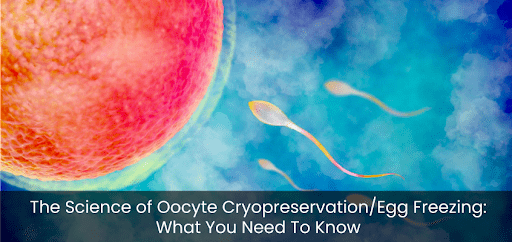Introduction
Every woman is born with a certain number of eggs. As they age, the eggs diminish in numbers and quality, impacting fertility success. The optimal age for reproduction (based on egg health) is during the early and mid-20s. Many women want to avoid pregnancy in their 20s but want to become pregnant later. Egg freezing or Oocyte Cryopreservation can be an option if you are one of these women. You can preserve your eggs and then use them at a later date.
This article discusses all you should know about egg preservation and whether it is the right choice.
Our Wellness Programs
What are human eggs?
The female reproductive system has a pair of ovaries connecting the uterus through fallopian tubes. Ovaries have oocytes where female germ cells partake in fertilisation and reproduction.
During fetal life, the ovaries contain over 6-7 million oocytes. The oocytes are fixed and not produced further. With birth, the number can drop from about a fifth to about a million. By puberty, the female body will have only 300000 oocytes left. These oocytes are immature, and with maturation, a majority will die. Only 300-400 eggs remain over a lifetime and are available for fertilisation.
The maturation phase of the eggs requires 14 days. Several oocytes mature and combine to form one large egg cell. This cell is then available for ovulation and fertilisation.
With each menstrual cycle, the number of oocytes subsequently reduces, and by menopause, all the eggs deplete.
Looking for services related to this subject? Get in touch with these experts today!!
Experts

Banani Das Dhar

India
Wellness Expert
Experience: 7 years

Devika Gupta

India
Wellness Expert
Experience: 4 years

Trupti Rakesh valotia

India
Wellness Expert
Experience: 3 years

Sarvjeet Kumar Yadav

India
Wellness Expert
Experience: 15 years

Shubham Baliyan

India
Wellness Expert
Experience: 2 years

Neeru Dahiya

India
Wellness Expert
Experience: 12 years
What is egg freezing or Oocyte Cryopreservation?
Egg freezing is a non-medical term for oocyte preservation. Specialised professionals extract, freeze and store the oocytes to preserve their reproductive potential.
Since its first success in 1986, oocyte preservation has undergone many advances and has a high success rate in egg survival following freezing.
A woman must undergo hormonal treatments to maximise egg production, ensuring more eggs are available for extraction and freezing. Under sedation, doctors will then extract the oocytes and the surrounding fluids. After an assessment to determine the maturity of these cells, the matured ones undergo cryopreservation. With the help of liquid nitrogen, the cells are cooled rapidly and can be stored indefinitely.
These preserved eggs undergo a thawing process to get them to room temperature when the woman is ready to become pregnant. She will need in vitro fertilisation (IVF). In IVF, the fertilisation occurs in the lab using either donor sperm or the woman’s partner.
What are the chances of getting pregnant with Oocyte Cryopreservation?
Frozen eggs can last longer. Also, the egg quality is better at an early age. Freezing your eggs in your early 20s can increase the chances of egg fertilisation compared to fertilising an unfrozen egg in the late 30s.
With medical advances, the survival of the egg has increased tremendously. Experts believe as many as 75% of the eggs extracted and frozen before 35 can survive the thawing process and are viable for fertilisation. Although the success rate reduces considerably after the 40s, you can still opt for it.
A fertilised egg becomes an embryo. Embryos are more likely to survive the freezing-thawing process. If you and your partner choose to get pregnant in the future, you may also consider embryo cryopreservation to enhance your success rate.
How much does egg freezing or Oocyte Cryopreservation cost?
Oocyte cryopreservation can be expensive. You will need to undergo several assessments to understand your menstrual cycle, hormonal treatments to maximise egg production, and extraction procedures. These will cost you, and sometimes you will require multiple extraction processes to ensure more opportunity is available for future IVF treatments.
The cost can rise if you add the amount for freezing and subsequent storing charges. With time, these charges will only increase as the medical expenses rise.
Insurance and team member benefits do not cover the expenses for egg preservation. However, some insurance does provide for these procedures in case of medical conditions, such as treatment for cancer. If you choose to preserve the egg for any other reason (non-medical), you will have to bear the expense. Hospital stay and medications will also put a hole in your pocket as insurance often does not cover them.
It would be wise to weigh your financial conditions and the odds of having a live birth.
Side effects of egg freezing or Oocyte Cryopreservation
With more women opting to get pregnant in their 30s, the demand for egg freezing procedures has increased in the past few years. But when you undergo this procedure for non-medical reasons, it is wise to make an informed decision.
- For egg retrieval, egg production needs to be optimised. In this way, you will be able to freeze more eggs with every cycle. Before the procedure, the ovaries need stimulation to increase their production of mature eggs.
- You will need to undergo several hormonal treatments to achieve the desired quantities of eggs produced. These hormones have their own set of side effects ranging from

- Weight gain
- Bloating
- Mood swings
- Pain
- Nausea and vomiting
- When storing the eggs, one has to undergo extraction in multiple cycles. It means repeated hormonal treatments before every extraction. Increased levels of these hormones can also risk a condition – ovarian hyperstimulation syndrome (O.H.S.). Studies indicate that long-term complications can involve a higher risk of ovarian cancer.
Conclusion
Egg preservation has a higher success rate if done in early life (under the 30s)—the egg quality declines with age. There is a reduction in the chances of the egg’s survival through the freezing and thawing processes. Sperm quality also determines the success of fertilisation.
When choosing a centre for cryopreservation, opt for a reputed one to maximise the success rate.
An important aspect to consider: oocyte cryopreservation does not guarantee a successful pregnancy and birth of a healthy baby. Since freezing more eggs can improve your rate of successful IVF sessions, you will need to extract the egg in multiple cycles. Also, when you remove the eggs for non-medical reasons, you may be unaware of the outcome and may even lose the opportunity of natural birth.
https://en.wikipedia.org/wiki/Oocyte_cryopreservation

















